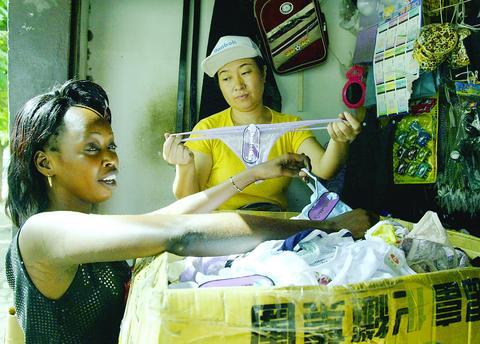The Chinese have arrived in Dakar, and their shops and wholesale outlets are an increasing source of worry and anger for local traders in the Senegalese capital.
Faced with low prices they cannot match and a flight of their customers to cheaper businesses they plan to close down the city's commercial activity on Aug. 23 as a gesture of protest.

PHOTO: AFP
The General de Gaulle boulevard, north of the city center, used to be a residential area. But since 2000 it has been transformed as the ground floors of buildings have been leased to Asian traders, most of them from China.
"Since the arrival of Chinese shopkeepers, the price of basic goods has been cut to a third or a fifth [of what it used to be]," the Senegal consumers' association Ascosen said last month.
"As a result many goorgorlu [ordinary Senegalese] have begun to be able to afford goods. Now electrical household goods are within the reach of every budget," the Ascosen said.
Street vendors have also benefited from the arrival of the Chinese. Lacking capital and permanent premises they can trade Chinese products which are far cheaper than those on offer from Senegalese wholesalers.
"It is quite normal that there is a price difference which works to the advantage of the Chi-nese," said Hassan Lee, 26, a native of Shanghai, who has lived in the west African state since 1999.
"We are more familiar with the Asian market where we buy our stock. I opened my shop in 2002 and I employ two Senegalese," Lee said.
Some Senegalese businessmen accuse their Chinese competitors of selling goods of poor quality while others claim Chinese-run businesses are screens for "dubious activities."
Last October four Chinese-run restaurants were shut down after the authorities found they had ties with organized crime, including prostitution and visa-trafficking.
"The Chinese bring no added value and do not really create jobs," said Dame Ndiaye, president of one of the four traders' associations taking part in the Aug. 23 protest.
"The government should control their activities out of respect for the rules governing residence in Senegal and trade. If it doesn't we shall organize a `closed city' day on August 23 and suspend all imports from October 15," he said.
"The Chinese sell junk and counterfeits. They stop us setting up small and medium-sized busi-nesses which generate jobs and productive activity," he said.
"Chinese traders do no harm to anyone," said Momar Seyni Mbengue, a former Senegalese ambassador to Beijing and the president of the Senegal-China friendship committee.
"They sell cheap goods and give work to Senegalese. The demands of Senegalese shopkeepers are selfish," he said.
Senegalese employees of Chi-nese businesses are paid an average of 50,000 local (CFA) francs a month (US$91) while the minimum wage is 35,000 CFA.
The friendship committee puts the number of Chinese families in Dakar and the rest of the country at 150.

The CIA has a message for Chinese government officials worried about their place in Chinese President Xi Jinping’s (習近平) government: Come work with us. The agency released two Mandarin-language videos on social media on Thursday inviting disgruntled officials to contact the CIA. The recruitment videos posted on YouTube and X racked up more than 5 million views combined in their first day. The outreach comes as CIA Director John Ratcliffe has vowed to boost the agency’s use of intelligence from human sources and its focus on China, which has recently targeted US officials with its own espionage operations. The videos are “aimed at

STEADFAST FRIEND: The bills encourage increased Taiwan-US engagement and address China’s distortion of UN Resolution 2758 to isolate Taiwan internationally The Presidential Office yesterday thanked the US House of Representatives for unanimously passing two Taiwan-related bills highlighting its solid support for Taiwan’s democracy and global participation, and for deepening bilateral relations. One of the bills, the Taiwan Assurance Implementation Act, requires the US Department of State to periodically review its guidelines for engagement with Taiwan, and report to the US Congress on the guidelines and plans to lift self-imposed limitations on US-Taiwan engagement. The other bill is the Taiwan International Solidarity Act, which clarifies that UN Resolution 2758 does not address the issue of the representation of Taiwan or its people in

US Indo-Pacific Commander Admiral Samuel Paparo on Friday expressed concern over the rate at which China is diversifying its military exercises, the Financial Times (FT) reported on Saturday. “The rates of change on the depth and breadth of their exercises is the one non-linear effect that I’ve seen in the last year that wakes me up at night or keeps me up at night,” Paparo was quoted by FT as saying while attending the annual Sedona Forum at the McCain Institute in Arizona. Paparo also expressed concern over the speed with which China was expanding its military. While the US

SHIFT: Taiwan’s better-than-expected first-quarter GDP and signs of weakness in the US have driven global capital back to emerging markets, the central bank head said The central bank yesterday blamed market speculation for the steep rise in the local currency, and urged exporters and financial institutions to stay calm and stop panic sell-offs to avoid hurting their own profitability. The nation’s top monetary policymaker said that it would step in, if necessary, to maintain order and stability in the foreign exchange market. The remarks came as the NT dollar yesterday closed up NT$0.919 to NT$30.145 against the US dollar in Taipei trading, after rising as high as NT$29.59 in intraday trading. The local currency has surged 5.85 percent against the greenback over the past two sessions, central